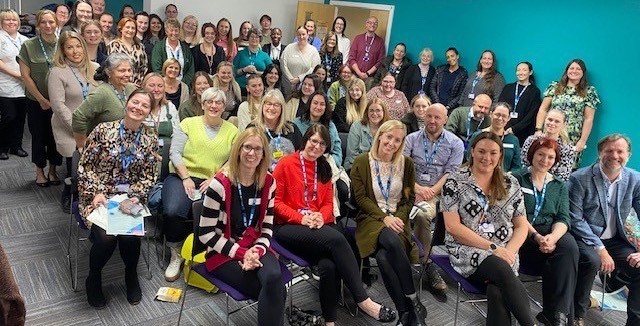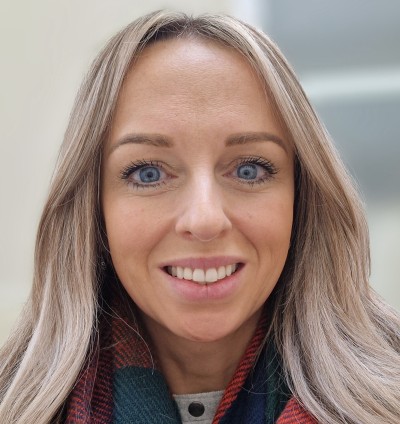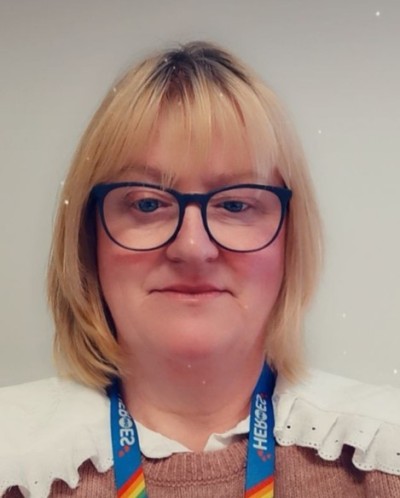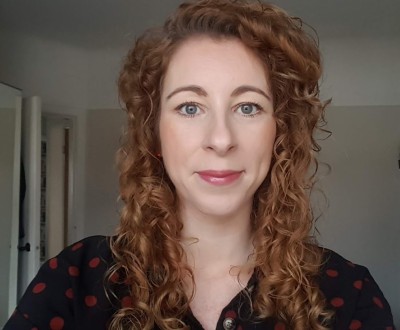
At Cheshire and Wirral Partnership, we are able to offer opportunities for allied health professionals (AHPs) within:
- Occupational therapy
- Speech and language therapy
- Physiotherapy
- Podiatry
- Dietetics
- Art therapy
Below you can view more information about the different allied health professions.

Natalie Hewitt joined Cheshire and Wirral Partnership in 2009 as a Specialist Speech and Language Therapist, working in community learning disability services. Natalie then trained as an Advanced Clinical Practitioner and qualified in 2020.
In this role, Natalie led on developing the pathways for assessment and treatment of neurodevelopmental conditions and took a secondment to the adult autism service to enhance her knowledge and skills.
She is also working with CANDDID and teaching at the University of Chester on the PGCert in neurodevelopmental conditions.
Most recently, she has been accepted onto a multi-professional consultant level practice training programme, which is funded by NHS England.
Natalie says: “I am so pleased that CWP supports Speech and Language Therapists to work in such dynamic ways, outside of the traditional roles.”
“My advice to allied health professionals who would like to progress their career, is to say “yes” to more activities that challenge you or take you out of your comfort zone."
"Don’t be afraid to learn new clinical skills or perhaps take part in research, education or leadership activities that will allow you to evolve as a clinician. With each challenge accepted, you will meet a range of different professionals, learn to work in different ways and prepare yourself for the next stage of career progression.”
Occupational therapists (OTs) work in the NHS, local authority social care services, housing, schools, prisons, voluntary and independent sectors, and vocational and employment rehabilitation services as well as in education and research. Occupational therapists work with people of all ages with a wide range of problems resulting from physical, mental, social or developmental difficulties.
OTs support people with a range of interventions to enable them to return to or optimise participation in all the things that people do; for example, caring for themselves and others, working, learning, playing and interacting with others. Being deprived of or having limited access to any or all of these occupations can affect physical and psychological health and hence OTs positively impact upon the wellbeing and rehabilitation of patients in most care pathways and in the broader public health and social care environment.

Ann-Marie has worked for Cheshire and Wirral Partnership for fifteen years. She initially applied for a clinical support worker role at Greenways which is a learning disability inpatient unit in Macclesfield, specialising in assessment and treatment for adults.
“I had never worked with patients with learning disabilities before, but something just clicked with me, and I knew that this is a role I would enjoy doing.”
She now works for the community learning disability team in Macclesfield as an occupational therapist (OT) apprentice.
“Having worked with occupational therapists as a clinical support worker and gradually developing my knowledge, this was an area which I wanted to pursue."
"As a mature student at the age of 52, I have a lot to give to this profession and it was a goal to become an occupational therapist, so I grabbed this opportunity. My advice to anyone is if you feel this is an area you would like to pursue, go for it.”
“My role can be very varied because I’ve worked alongside different disciplines within the team before this apprenticeship. But I work closely with patients, care providers and the occupational therapists around sensory issues and implementing sensory diets, any behaviours and how being engaged in something they enjoy can help reduce some behaviours.”
Ann-Marie started her placement in March this year, as part of a three-year course and is just coming to the end of her first placement, which was in the community intermediate care.
“I enjoy everything about my role, it is very varied. It can sometimes be challenging, but being able to implement interventions which enable someone to have a better quality of life is worthwhile and having positive feedback from parents and care providers makes you feel valued and that you are doing a good job.”
“Working with patients and seeing improvements can be very rewarding. It doesn’t have to be big; it may be something small, but it means so much to them. I've met so many different people, and been involved in many different projects and research programmes which will enable me to be a better AHP and play an important role, feel valued and listened to within the wider multi-disciplinary teams.”
Ceri works as a senior occupational therapist for Cheshire and Wirral Partnership.
"I feel privileged to work as an occupational therapist in the specialist perinatal team. Occupational therapy is so important to empower the mum’s we work with, to adapt to this new role and give them the tools to overcome challenges on this journey."
Speech and language therapists (SLTs) in the UK work with children and adults to help them overcome or adapt to a vast array of disorders of speech, language, communication and swallowing.
These include helping young children to access education, working with young offenders to enable them to access the programmes designed to reduce reoffending, reducing life-threatening swallowing problems in the early days after stroke and providing essential support to adults with a range of acquired neurological communication difficulties to help them return to work, and their roles in their family and society.
Physiotherapy uses physical approaches to promote, maintain and restore physical, psychological and social well-being, working through partnership and negotiation with individuals to optimise their functional ability and potential.
Physiotherapists address problems of impairment, activity and participation and manage recovering, stable and deteriorating conditions – particularly those associated with the neuro-muscular, musculo-skeletal, cardio-vascular and respiratory systems – through advice, treatment, rehabilitation, health promotion and supporting behavioural change.
Physiotherapy uses manual therapy, therapeutic exercise, the application of electro-physical modalities and other physical approaches in response to individual need. Physiotherapists work across sectors and settings, including acute, community and workplace settings, and with a large number of population and patient groups including children, the working population, and older people.
Podiatrists provide essential assessment, evaluation and foot care for a wide range of patients with a variety of conditions both long term and acute. Many of these fall into high risk categories such as patients with diabetes, cerebral palsy, peripheral arterial disease and peripheral nerve damage where podiatric care is of vital importance.
Many podiatrists have become further specialised into either the area of biomechanics or surgery. Biomechanics is often associated with treating sports related injuries but spans across a wide range of conditions including children and the elderly.
Podiatric surgeons offer surgical interventions in all aspects of foot health management. Podiatrists work in both the community and acute settings and while many are employees of the NHS many podiatrists now provide healthcare services in the private sector.
Dietitians are the only qualified health professionals who assess, diagnose and treat diet and nutritional problems at an individual and wider public health level.
Uniquely, dietitians use the most up–to-date public health and scientific research on food, health and disease, which they translate into practical guidance to enable people to make appropriate lifestyle and food choices. Dietitians are the only nutrition professionals to be regulated by law, and are governed by an ethical code to ensure that they always work to the highest standard.
Dietitians work in the NHS, private practice, industry, education, research, sport, media, public relations, publishing, government and Non-Government Organisations (NGOs). Dietitians advise and influence food and health policy across the spectrum from government, to local communities and individuals.
Jade Topping works for Cheshire and Wirral Partnership as a Specialist Eating Disorders Dietitian.

"I trained as a Dietitian at Leeds Metropolitan University. After initially working at the Royal Liverpool Hospital in a varied role on different wards and as a Diabetes Specialist"
Jade joined CWP 7 years ago working across different community eating disorders teams and has recently joined our new Cheshire and Merseyside T1DE service which is one of 5 UK pilot sites treating Type 1 diabetes and disordered eating.
"As an eating disorders dietitian, my role is varied as I identify and treat nutritional deficiencies, provide psychoeducation about the impact of malnutrition, a balanced diet, ‘normal’ eating behavours, exercise advice, tackling avoided foods and sometimes meal plans."
Dietitians also support the multi-disciplinary team in making decisions about patient care and provide education to the team.
Further information about dietitians and our varied roles, both clinically and in the industry can be found on How to become a dietitian (bda.uk.com)
Art therapists use art as a form of psychotherapy to encourage clients to explore a variety of issues including emotional, behavioural or mental health problems, learning or physical disabilities, life-limiting conditions, neurological conditions or physical illnesses.
People of all ages from children to the elderly, regardless of artistic experience, use art therapy in this way as an aid to supporting them with their particular concern. It is not a diagnostic tool but rather a mode of communication and expression.
